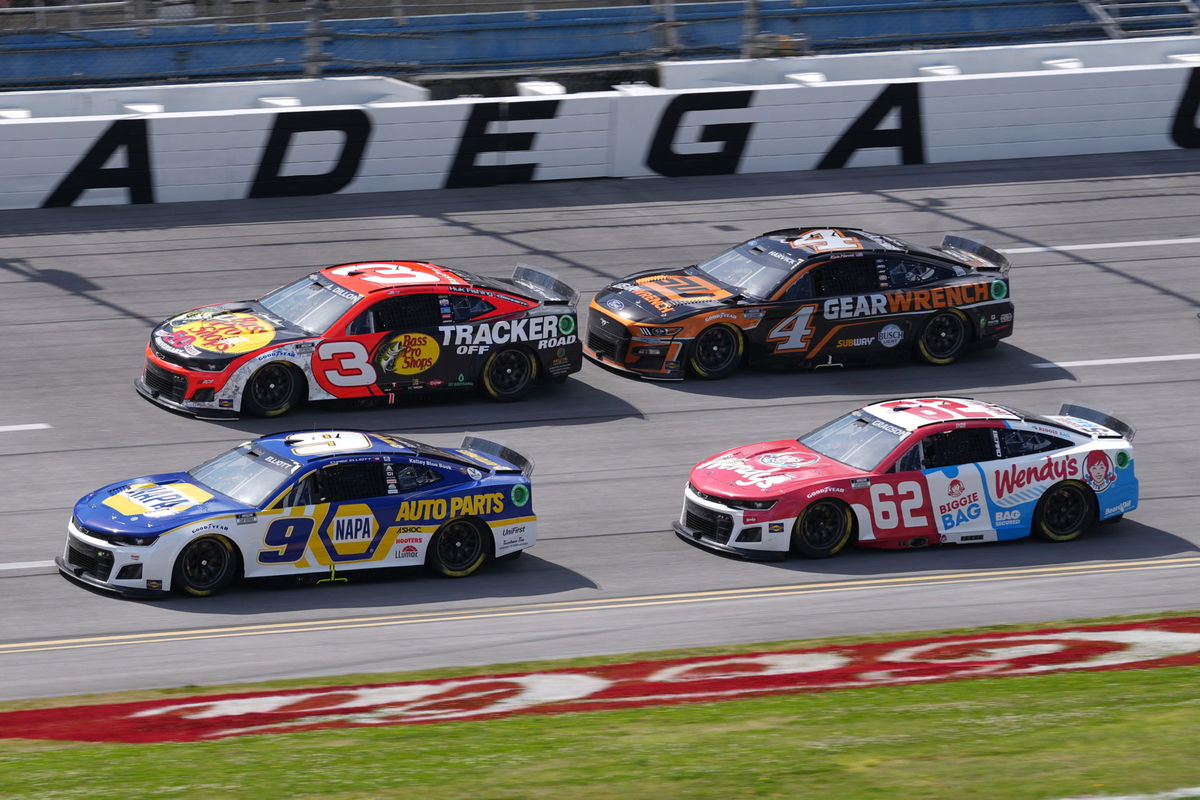
USA Today via Reuters
Apr 24, 2022; Talladega, Alabama, USA; NASCAR Cup Series driver Chase Elliott (9), Austin Dillon(3), Kevin Harvick(4) and Noah Gragson (62) race during the GEICO 500 at Talladega Superspeedway. Mandatory Credit: Jasen Vinlove-USA TODAY Sports

USA Today via Reuters
Apr 24, 2022; Talladega, Alabama, USA; NASCAR Cup Series driver Chase Elliott (9), Austin Dillon(3), Kevin Harvick(4) and Noah Gragson (62) race during the GEICO 500 at Talladega Superspeedway. Mandatory Credit: Jasen Vinlove-USA TODAY Sports
Following the Jack Link’s 500 at Talladega, NASCAR sent shockwaves through the garage by disqualifying both Ryan Preece and Joey Logano. Preece’s No. 60 Ford had extra shims on its spoiler. Logano’s Team Penske Ford? Missing a bolt entirely. In a race built on inches and instincts, these infractions were enough to wipe away two solid finishes.
Watch What’s Trending Now!
And just when you thought the weekend’s chaos had peaked, another bombshell dropped. This time from the Xfinity garage. As pre-race scrutiny swept through Talladega like one of its signature wrecks, two drivers, one a fan favorite, the other a rising name, were hit hard.
ADVERTISEMENT
Talladega tech trouble costs Matt DiBenedetto and Austin Green big
Talladega’s high-speed chaos usually makes headlines for what happens on the track. But this time, NASCAR’s rulebook stole the spotlight. Earlier, Cup drivers like Joey Logano and Ryan Preece (both Fords) bore the brunt of disqualifications right after the Cup Series race. Preece, in particular, had the biggest loss after being handed the penalty.
Preece, while missing out on a race win by just 0.022s, still had a podium finish to his name. The disqualification meant he was demoted all the way down to the other end of the spectrum – 38th position. Similarly, Logano was handed a 39th-place finish. The Xfinity teams weren’t spared either. This time, too, two cars (but both Chevrolets) were flagged before the green flag even waved, thanks to a pre-race inspection hiccup.
Matt DiBenedetto’s No. 99 Viking Motorsports car and Austin Green’s No. 87 Jordan Anderson Racing entry were both found in violation of Section 14.4.A and 14.4.11.C&D of the NASCAR rule book. The issue? Rear bumper cover modifications. NASCAR’s inspection team spotted the infraction during their pre-race routine, long before either driver had a chance to prove themselves on the superspeedway.
ADVERTISEMENT
As a result, NASCAR dropped the hammer with a Level 1 (L1) penalty, which is hefty by Xfinity standards. Both teams were fined $25,000. On top of that, DiBenedetto and Green were each docked 20 driver and owner points, along with five valuable playoff points. For DiBenedetto, the penalty stings, but it doesn’t change his place in the standings. He stays 24th. Green, driving a part-time schedule, isn’t chasing points this season.
Matt DiBenedetto and Austin Green have been docked 20 driver (and owner) points and 5 playoff points and the team fined $25K for rear bumper cover violation found in Xfinity prequalifying/prerace tech at Talladega.
— Bob Pockrass (@bobpockrass) April 29, 2025
ADVERTISEMENT
Neither team, like their Cup Series counterparts, has indicated plans to appeal the penalty. Unlike the disqualifications in the Cup, which affected post-race results, these infractions were flagged before a single lap was turned. Still, it underscores NASCAR’s increased scrutiny across all three national series. And with more superspeedway races coming, it’s a clear message: even the smallest tweaks to bodywork can bring major consequences.
Top Stories
Jimmie Johnson Caught at Center of Fan Storm as NASCAR Controversial Rule Sparks Daytona Backlash
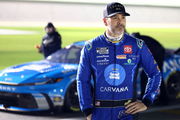
Cup Legend to Step Down From His Role as NASCAR Organization Names New Executive Leader
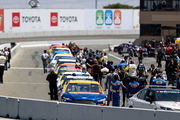
Dale Jr Breaks Silence on His Media Empire ‘Agony’ as He Finally Snaps Back at Fan Expectations

Coach Gibbs Pulls the Trigger on Massive JGR Sale, Triggering $25M Shake-Up in Charlotte
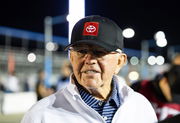
Mark Martin Sounds Alarm on ‘Biggest’ On-Track Fan Moments That Killed Unfiltered NASCAR Rants
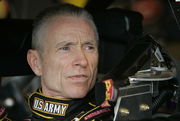
NASCAR’s strict penalties for the 2025 season
NASCAR’s 2025 season has ushered in a new era of strict penalties and rule enforcement. It reflects the sport’s determination to ensure fairness and integrity across all levels of competition. This crackdown comes after several controversial moments in recent years, where technical gray areas and manufacturer influence raised concerns about a level playing field. We all know what happened in the playoff race at Martinsville. So, be it technical cheating or cahooting on the track, expect NASCAR to rule with an iron fist.
ADVERTISEMENT
A major change for 2025 is the introduction of a defined penalty structure for manufacturers, not just teams or drivers. If an Original Equipment Manufacturer (OEM) is found violating NASCAR rules, they now face significant consequences. For example, manufacturers can incur the loss of 25-50 manufacturer points, 30-60 wind-tunnel hours, 250-500 restricted computational fluid dynamics (RCFD) test runs, and even 2-4 vehicle tests.
These changes are a response to incidents from the 2024 season and a broader push for transparency and accountability. By streamlining rules and increasing the severity of penalties, NASCAR hopes to restore trust among fans and participants alike. As evident from the recent Talladega penalties, the message is clear. In 2025, there’s little room for bending the rules, and the consequences for doing so are more severe than ever.
ADVERTISEMENT
ADVERTISEMENT
ADVERTISEMENT
ADVERTISEMENT

